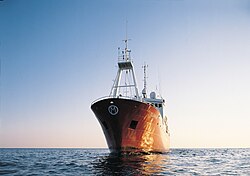
A weather ship, or ocean station vessel, was a ship stationed in the ocean for surface and upper air meteorological observations for use in weather forecasting. They were primarily located in the north Atlantic and north Pacific oceans, reporting via radio. The vessels aided in search and rescue operations, supported transatlantic flights,[1][2][3] acted as research platforms for oceanographers, monitored marine pollution, and aided weather forecasting by weather forecasters and in computerized atmospheric models. Research vessels remain heavily used in oceanography, including physical oceanography and the integration of meteorological and climatological data in Earth system science.
The idea of a stationary weather ship was proposed as early as 1921 by Météo-France to help support shipping and the coming of transatlantic aviation. They were used during World War II but had no means of defense, which led to the loss of several ships and many lives. On the whole, the establishment of weather ships proved to be so useful during World War II for Europe and North America that the International Civil Aviation Organization (ICAO) established a global network of weather ships in 1948, with 13 to be supplied by Canada, the United States and some European countries. This number was eventually cut to nine. The agreement of the use of weather ships by the international community ended in 1985.
Weather ship observations proved to be helpful in wind and wave studies, as commercial shipping tended to avoid weather systems for safety reasons, whereas the weather ships did not. They were also helpful in monitoring storms at sea, such as tropical cyclones. Beginning in the 1970s, their role was largely superseded by cheaper weather buoys. The removal of a weather ship became a negative factor in forecasts leading up to the Great Storm of 1987. The last weather ship was Polarfront, known as weather station M ("Mike"), which was removed from operation on January 1, 2010. Weather observations from ships continue from a fleet of voluntary merchant vessels in routine commercial operation.